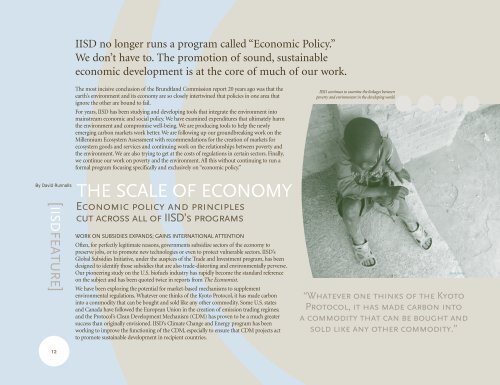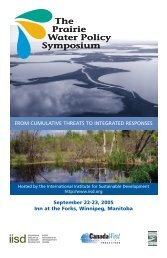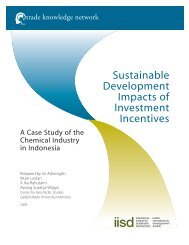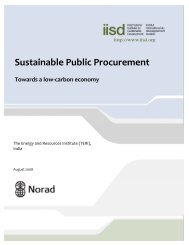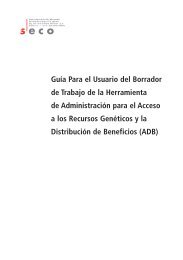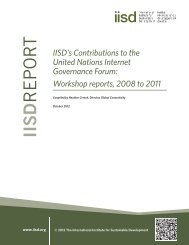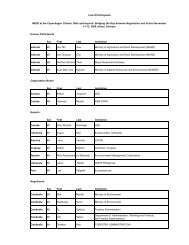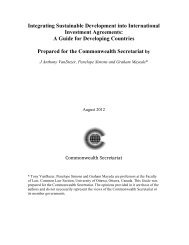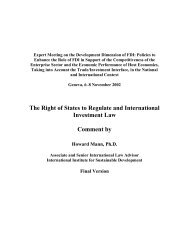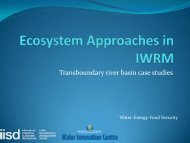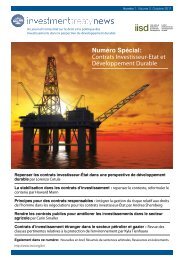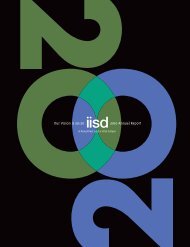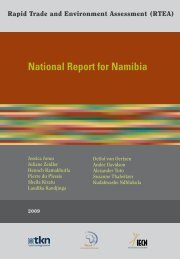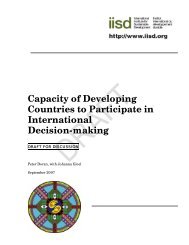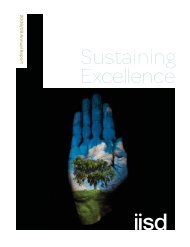2006/2007 Annual Report - International Institute for Sustainable ...
2006/2007 Annual Report - International Institute for Sustainable ...
2006/2007 Annual Report - International Institute for Sustainable ...
You also want an ePaper? Increase the reach of your titles
YUMPU automatically turns print PDFs into web optimized ePapers that Google loves.
IISD no longer runs a program called “Economic Policy.”<br />
We don’t have to. The promotion of sound, sustainable<br />
economic development is at the core of much of our work.<br />
By David Runnalls<br />
[IISDFEATURE]<br />
The most incisive conclusion of the Brundtland Commission report 20 years ago was that the<br />
earth’s environment and its economy are so closely intertwined that policies in one area that<br />
ignore the other are bound to fail.<br />
For years, IISD has been studying and developing tools that integrate the environment into<br />
mainstream economic and social policy. We have examined expenditures that ultimately harm<br />
the environment and compromise well-being. We are producing tools to help the newly<br />
emerging carbon markets work better. We are following up our groundbreaking work on the<br />
Millennium Ecosystem Assessment with recommendations <strong>for</strong> the creation of markets <strong>for</strong><br />
ecosystem goods and services and continuing work on the relationships between poverty and<br />
the environment. We are also trying to get at the costs of regulations in certain sectors. Finally,<br />
we continue our work on poverty and the environment. All this without continuing to run a<br />
<strong>for</strong>mal program focusing specifically and exclusively on “economic policy.”<br />
THE SCALE OF ECONOMY<br />
Economic policy and principles<br />
cut across all of IISD’s programs<br />
WORK ON SUBSIDIES EXPANDS; GAINS INTERNATIONAL ATTENTION<br />
Often, <strong>for</strong> perfectly legitimate reasons, governments subsidize sectors of the economy to<br />
preserve jobs, or to promote new technologies or even to protect vulnerable sectors. IISD’s<br />
Global Subsidies Initiative, under the auspices of the Trade and Investment program, has been<br />
designed to identify those subsidies that are also trade-distorting and environmentally perverse.<br />
Our pioneering study on the U.S. biofuels industry has rapidly become the standard reference<br />
on the subject and has been quoted twice in reports from The Economist.<br />
We have been exploring the potential <strong>for</strong> market-based mechanisms to supplement<br />
environmental regulations. Whatever one thinks of the Kyoto Protocol, it has made carbon<br />
into a commodity that can be bought and sold like any other commodity. Some U.S. states<br />
and Canada have followed the European Union in the creation of emission trading regimes;<br />
and the Protocol’s Clean Development Mechanism (CDM) has proven to be a much greater<br />
success than originally envisioned. IISD’s Climate Change and Energy program has been<br />
working to improve the functioning of the CDM, especially to ensure that CDM projects act<br />
to promote sustainable development in recipient countries.<br />
IISD continues to examine the linkages between<br />
poverty and environment in the developing world.<br />
iStockphoto<br />
“Whatever one thinks of the Kyoto<br />
Protocol, it has made carbon into<br />
a commodity that can be bought and<br />
sold like any other commodity.”<br />
12


